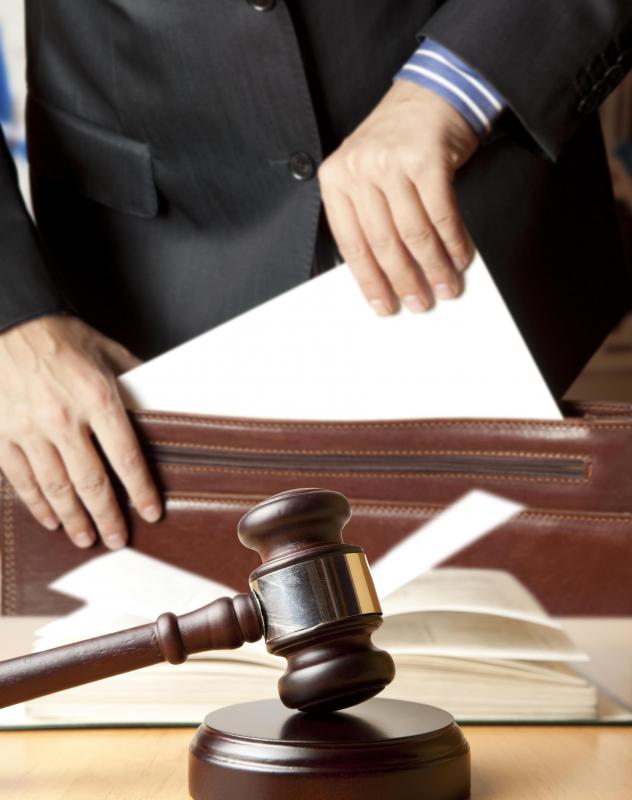At MyLawQuestions, we're committed to delivering accurate, trustworthy information. Our expert-authored content is rigorously fact-checked and sourced from credible authorities. Discover how we uphold the highest standards in providing you with reliable knowledge.
What Happens at a County Courthouse?
Under the traditional common law system, legal disputes travel through the courts according to a prescribed plan of appeals and ascension. Lawsuits must be brought in a local court — sometimes called a county court — first. The county courthouse or local courthouse is the building where lawsuits are filed for the first time, and where the majority of disputes are settled or resolved. A county courthouse serves a variety of important functions, from creating original case files for a variety of disputes to providing meeting places for attorneys and clients and housing courtrooms and judicial chambers where decisions are written and released.
The common law system was created in England, and remains the governing legal scheme for all of the United Kingdom. Most of the time, the term “county court” refers to an English or Irish local-level court. The phrase also has resonance in other common law-based countries, including the United States, Canada, Australia, and parts of India. In these countries, however, it is more likely that a county court will be called a circuit court or a superior court, usually for a named county. A building that is called the “Central County Superior Court,” for instance, is a county courthouse.

County courts are plentiful, typically with at least one in each city or town. The most significant thing that happens in the courthouse is the resolution of disputes at trial. A lot more than legal argument happens in a county courthouse, however.
As a body, the county court system functions as the first level of courtroom access. Residents who have disputes with each other or with businesses or companies must start by bringing their dispute to a county courthouse in the locality where at least one of the parties resides. This begins by filing a complaint with the county clerk. The clerk receives the complaint, assigns it a docket number, and refers it to a judge.

Most county courthouses have several judges who hear cases. When a county judge is assigned a case, he or she will contact the parties and their attorneys to set up pre-trial meetings, and to schedule a court date. All of these meetings happen in rooms in the county courthouse.
Different jurisdictions have different rules regarding what sorts of matters can be tried in a county courthouse. Some county courts have traffic and small claims divisions for handling more minor matters. Depending on the location and the facilities available, the courts may be able to handle both criminal and civil litigation. County courts in small, particularly rural areas are often limited to civil matters, with crimes like robberies and homicides referred to county or district-level courts in bigger areas.
In the United States, the only claims that most county courthouses can simply not accept are claims that invoke federal, or national, law. The U.S. legal system is an intersection of both state-created laws and federally-mandated laws. A county courthouse can typically only entertain state or local law disputes. Any claim that implicates federal rights, as well as any claim that names the U.S. government as a party, must generally be brought in a designated federal court.
AS FEATURED ON:
AS FEATURED ON:












Discussion Comments
Our local newspaper had an article not long ago about the long lines to get a license plate at the county courthouse. People are standing in line for over an hour just for tags. That's unreal.
I was able to buy my license plate online this year, but it irritated me because I paid about $6 extra for the privilege. I paid $3 for the mailing fee, and then another $3 as a "convenience fee" Convenient for whom? I guess it was worth it not to have to stand in line. But you pay for everything these days, so I guess I shouldn't be surprised that I paid extra to use a debit card. Good grief.
I don't know about other states, but our county courthouse handles just about everything legal you could need.
We have to get our license plates for cars, boats and motorcycles there, get our driver's licenses renewed, register to vote, get a marriage license, pay property tax, and go to court there.
Our county courthouse doesn't have nearly enough parking, considering the kinds of business so many people have to transact there, so it's a constant fight for a parking place, which is a pain in the neck when you're trying to get something done on your lunch break, or before you get to work. It's pretty annoying.
Post your comments